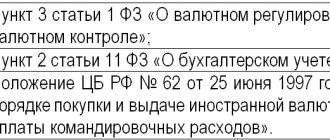One of the first partners with which any enterprise enters into a relationship is a bank. Opening a current account, making payments, registering currency transactions, buying or selling currency - all this is possible only if you have an agreement with a banking organization. The bank, like any partner providing services, issues invoices for payment or debits amounts from the organization’s current account for the bank’s services provided. How to correctly reflect such business transactions in the 1C: Accounting program, edition 3.0 will be discussed in this article.
Bank services can be combined into two large groups:
- Services not subject to VAT;
- Services subject to VAT.
Each group of services has its own peculiarities of generating accounting entries.
Services not subject to VAT are reflected in accounting accounts in the following order:
- D 91.02 (Other expenses) – D 51 (Current account) – bank commission amounts are written off as other expenses.
Services subject to VAT are reflected in accounting accounts in the following order:
- D 76 (Settlements with various debtors, creditors) – D 51 (Current account) – funds were transferred from the current account as a reflection of the bank’s commission;
- D 91.02 (Other expenses) - D 76 (Settlements with various debtors and creditors) - accounts receivable are written off as other expenses as expenses for bank services;
- D 19 (VAT on purchased services) – K 76 (Settlements with various debtors and creditors) – VAT on purchased bank services is reflected.
Let's consider the reflection of each group of bank services in 1C 8.3.
Expenses for banking services - transfer of wages to employee cards
The bank charges a fee for processing documentation related to the transfer of salaries to employees' accounts. According to the provisions of the Letter of the Ministry of Finance of the Russian Federation dated April 20, 2009 No. 03-03-06/2/88 and the Letter of the Ministry of Finance of the Russian Federation dated August 4, 2008 No. 03-04-06-02/88, the costs of paying remuneration to the bank in this case are allowed to be included in income tax expenses.
But controversy is caused by a reduction in the tax base by the amount of expenses for paying the bank a commission for issuing and annual servicing of plastic cards of employees, on which salaries are received. The condition for including expenses as expenses is their economic justification, and the commission is paid to the bank by the enterprise, but the cards are used by workers. The latest statement on this matter by the Ministry of Finance of the Russian Federation is set out in Letter No. 03-04-06/6-255 dated October 28, 2010, which states that the commission paid to the bank for servicing salary cards is not the income and benefit of employees (not subject to personal income tax) who use these cards is just a necessity related to the choice of payment method for wages
(the employer is obliged to pay wages on time through the cash register or in another way).
Important!
Payments by the employer to the bank for servicing employee salary accounts are not subject to personal income tax and are not subject to insurance contributions.
As for judicial practice, the courts accept the position of taxpayers and allow the costs of paying bank commissions to be taken into account as expenses. For example, the FAS Decree UO dated October 29, 2009 No. Ф09-8382/09-С3 explains the following:
- according to employment contracts, the costs of paying for bank services for servicing the salary account are borne by the employer;
- bank cards are needed to fulfill the employer’s obligation to pay wages (wages are related to the conduct of commercial activities);
- salary cards are not the property of employees - they are the property of banks and are issued to employees for temporary use.
Important!
In the agreement with the bank on servicing salary accounts, it should be mentioned that the cards were made for the needs of the enterprise, and not for the employee.
The accountant must take into account the costs in question as part of other expenses, taking care of the proper execution of personnel documents. In the text of employment contracts, additional agreements to such or other internal acts of the company, it is necessary to specify the following conditions:
- salaries will be paid by non-cash method;
- the costs of banking servicing of salary accounts are borne by the employer;
- in case of dismissal, the employee returns the card to the employer.
How much does it cost to open an account?
The operation of opening an account is most often free of charge. But for other operations you have to pay. The cost of a particular service depends on the chosen tariff.
Almost every line of cash settlement offers in banks has a tariff for beginners in business or existing companies with very small turnover. In this case, the subscription fee will be 0 rubles. In this case, all additional functions will be paid.
You can go the opposite way - choose a more expensive tariff and use the free services included in it. It all depends on what functionality is needed. Typically, the most expensive tariffs cost between 3000-5000 rubles.
Expenses for banking services - an enterprise acquires a fixed asset
One of the biggest challenges is deciding whether to include banking fees in the tax cost of the acquired asset. An example is a situation where a bank charges a fee for opening a letter of credit for the purchase of some equipment under an import contract.
Let's talk. According to paragraph 1 of Art. 257 of the Tax Code of the Russian Federation, the initial cost of an asset includes the amount of costs for its purchase, manufacturing, construction, delivery, as well as bringing it to a state in which it can be used for its intended purpose. Why does a company pay a commission on a letter of credit? For the purpose of purchasing equipment. Accordingly, the amount of remuneration to the bank can be considered as a purchase cost and taken into account in the initial cost of the fixed asset. However, the bank's commission for opening a letter of credit is a fee for the bank's service. Then the costs should be classified as other or non-operating expenses. The Ministry of Finance of the Russian Federation expressed as many as 3 different positions on this matter:
- In Letter No. 03-03-04/1/111 dated 01.08.2005, the Ministry of Finance of the Russian Federation analyzed the situation with the payment of bank remuneration for providing a bank guarantee. Department officials stated that a bank guarantee for a loan taken to purchase an enterprise asset is related to the purchase of a fixed asset, which means that the costs of paying it must be included in the initial cost of the fixed asset.
- In the text of Letter No. 03-03-06/1/673 dated December 5, 2008, financiers proposed to include the costs of paying the commission for opening a letter of credit and its servicing as part of non-operating expenses.
- Letter No. 03-03-06/1/408 dated June 18, 2009 contains instructions regarding the accounting of expenses for paying commissions to the bank as interest, which are taken into account under Article 269 of the Tax Code of the Russian Federation. In this case, the norms of Art. 269 of the Tax Code of the Russian Federation is recognized by financiers as special, priority in relation to the norms of Art. 257 Tax Code of the Russian Federation. The letter of credit commission, in their opinion, is taken into account as interest on debt obligations and is not included in the initial cost of the fixed asset.
Important!
Clause 4 art. 252 of the Tax Code of the Russian Federation allows an enterprise to independently determine the procedure for accounting for expenses if expenses can be assigned to several groups of expenses on an equal basis. This position is supported by the courts.
Costs for banking services – the company applies for a loan
Legal entities and individual entrepreneurs often need additional cash injections into their business to keep it afloat in difficult times or to expand. Sometimes one of the conditions for issuing a loan is that the credit institution charges additional fees. Most often, additional payments are assigned as follows:
- commission for early repayment of the loan;
- remuneration for opening a credit line and its extension;
- additional fee for opening a loan account and its maintenance;
- commission for using a loan.
The Tax Code allows the taxpayer to choose the option for accounting for expenses for banking services that seems most appropriate to him (both options provide an open list of expenses taken into account):
- it is permitted to include such costs as non-operating expenses;
- You can also take into account the costs of banking services as part of other expenses associated with production and sales.
However, the Ministry of Finance of the Russian Federation has its own opinion regarding the accounting of such expenses, set out in Letters dated August 27, 2012 No. 03-03-06/1/432, dated August 29, 2011 No. 03-03-06/1/534. According to department officials, in this way it is allowed to take into account only those commission payments to a banking institution that are paid in a fixed amount and are presented in absolute terms. And if the bank’s remuneration is determined as a percentage, the commission must be considered as interest on debt obligations. Such payments must be standardized according to Art. 269 of the Tax Code of the Russian Federation. That is, in order to accept interest commissions as income tax expenses, the accountant must calculate the maximum amount of interest commissions when an enterprise receives a loan on a par with the maximum amount of interest for the use of borrowed funds.
But the position of the Ministry of Finance of the Russian Federation cannot but cause controversy. Interest based on clause. 2 p. 1 art. 265 of the Tax Code of the Russian Federation are calculated for tax purposes based on the actual time of use of funds borrowed on credit. At the same time, additional loan commissions, paid as a percentage, depend on the size of the loan, and not on the period of use of the funds. Moreover, interest is paid by the borrower for the bank's services, and not for the use of funds. The courts also do not support this opinion of the financial department. For example, in the Resolution of the Federal Antimonopoly Service of Moscow dated October 11, 2012 No. F05-11313/12, the court explains that the bank’s commission for issuing a loan is an independent payment charged by the bank for the loan service, and therefore the payment cannot be equated to interest on debt obligations. Expenses for payment of fees should be taken into account by the borrower's accountant as part of other expenses or non-operating expenses. With regard to payments for opening a letter of credit and commissions under a factoring agreement, the courts accept the following positions:
- There is no judicial practice on the issue of attributing expenses for paying commissions for opening letters of credit, so companies have the right to attribute such costs to other or non-operating expenses (when arguing your position, you can refer to the legal nature of a letter of credit - this is not borrowing, the function of a letter of credit is to carry out non-cash payments (Article 862 of the Civil Code of the Russian Federation), accordingly, a bank commission is paid for carrying out such an operation, and the commission also depends on the amount of the letter of credit);
- according to the courts, commissions under a factoring agreement should be classified as other and non-operating expenses, because the obligation under a factoring agreement is not a debt obligation, and therefore the bank’s commission is not recognized as interest, which must be normalized (Resolution of the Federal Antimonopoly Service of the Moscow Region dated February 16, 2011 No. KA-A40/ 16965-10).
Reflection in the accounting of the commission of the acquiring bank
The Contractor provides the customer with services for receiving funds, including acquiring. The acquiring agreement is concluded by the bank with the contractor. The acquiring commission is retained by the bank, transferring the amount to the contractor minus the commission. The contractor transfers this money to the customer.
Features of the paying agent's activities
The activities of the contractor fall under the definition of the activities of a paying agent (clause 4, article 4 of the Federal Law “On the National Payment System” dated June 27, 2011 N 161-FZ).
A paying agent is any legal entity (except a bank) or any individual entrepreneur that accepts cash from individuals in payment for goods (subclause 3 of article 2 of the Federal Law of June 3, 2009 No. 103-FZ “On activities for accepting payments from individuals carried out by payment agents").
Expenses for banking services – other or non-operating
In some cases, it is quite difficult to establish a connection between an enterprise’s costs for paying for banking services and the organization’s core activities. As an example, let's take the bank commission charged for servicing a loan account that was opened to support a loan. It can be argued that the commission is charged for the bank providing financing for the commercial company to carry out its activities. That is, on the basis of sub. 25 clause 1 art. 264 of the Tax Code of the Russian Federation, the commission can be considered other costs associated with production and sales. But we can also say that the banking commission does not have a direct focus on carrying out the production and sales activities of the enterprise. The bank's remuneration only mediates the company's receipt of borrowed funds. Accordingly, on the basis of sub. 15 clause 1 art. 265 of the Tax Code of the Russian Federation, the commission must take into account non-operating expenses.
As for judicial practice, arbitration courts side with the taxpayer (as in the case of the FAS Moscow Region Resolution No. F05-11313/12 dated October 11, 2012), because in such a situation, paragraph 4 of Art. 252 of the Tax Code of the Russian Federation allows taxpayers to make a choice in favor of one of the positions at their discretion.
What can be said for sure is that when choosing any of the proposed options (accounting for bank commissions as part of non-operating expenses or as part of expenses associated with production and sales), the tax base for income tax is not distorted. Therefore, making a mistake is not so scary - the tax authorities are loyal to the company’s choice and accept its position.
How is it calculated
Commissions can be charged one-time (for each transaction or service) or monthly (regardless of the client’s activity). There are three traditional ways:
- in the form of an absolute value - for example, 200 rubles monthly for card maintenance;
- as a percentage - for example, 1% of the amount of each transaction;
- in a combined form - for example, 2% of the amount of cash withdrawn from an ATM + 100 rubles.
There are other options: for example, 1% of the transaction amount, but not less than 200 rubles.
Common mistakes
Error:
The company refuses to recognize the bank commission for the letter of credit as an expense for bank services.
A comment:
This method is the most beneficial for organizations on the grounds that it allows the commission to be legally attributed to the reduction of income for tax purposes at a time (clause 7 of Article 272 of the Tax Code of the Russian Federation), and not included in expenses through depreciation.
Error:
The accountant recognized as a one-time tax expense the company's expenses for paying bank commissions for servicing employees' salary accounts.
A comment:
Such costs must be distributed between reporting periods, since costs must be taken into account in the period during which they arose based on the terms of the transaction, and card servicing is carried out continuously throughout the annual period.
Answers to common questions about the costs of banking services
Question #1:
Does the Ministry of Finance of the Russian Federation equate fees in percentage terms for other banking services, in addition to commissions for issuing a loan, to interest on debt obligations for tax purposes?
Answer:
Yes, according to the Ministry of Finance of the Russian Federation, other payments for banking services expressed as a percentage are also subject to rationing under Article 269 of the Tax Code of the Russian Federation. For example, commissions for opening a letter of credit (Letter of the Ministry of Finance of the Russian Federation dated June 18, 2009 No. 03-03-06/1/408), provision of a loan against the assignment of a monetary claim under a factoring agreement (Letter of the Ministry of Finance of the Russian Federation dated May 13, 2009 No. 03-07-11 /136).
Question #2:
Do employees of the financial department classify the bank's commission for providing a bank guarantee as interest on debt obligations?
Answer:
No. In its Letter No. 03-03-06/1/4 dated January 11, 2011, the Ministry of Finance of the Russian Federation canceled its decision regarding the recognition of the bank commission for the provision of a bank guarantee as interest on debt obligations.







